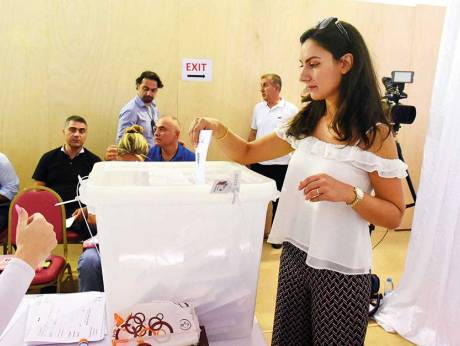
On May 6, Lebanon held its first parliamentary elections in nearly a decade. Since 2009, Lebanon faces several new challenges — the influx of Syrian refugees, the breakdown of waste management, economic crisis. Sunday’s election was Lebanese voters’ first opportunity to hold parliament accountable for its responses to these challenges. The elections were also an occasion for other firsts — a new electoral law with a proportional representation component, standardized ballot and provision for expat voting; as well as the participation of a record-breaking number of women candidates; and a broad civil society coalition opposing traditional elites.
The official results make two things clear. First, traditional parties won out against civil society challengers, although victory came amid accusations of electoral fraud. Second, Christian parties and Hezbollah’s coalition emerged stronger — while the prime minister’s movement weaker.
A victory for traditional parties, but not without controversy
In the wake of the 2015 trash crisis and the You Stink protest movement’s inability to make concrete gains, diverse segments of civil society turned to an electoral strategy. In the 2016 municipal elections, this took form as Beirut Madinati. By 2018, the wave of electoral activism had led to the creation of Kollouna Watani, a coalition of 11 civil society groups challenging establishment parties in 9 of Lebanon’s 15 districts.
Yet, despite continuing crises and civil society’s efforts to present a viable alternative, voters delivered a clear victory for establishment elites of all political persuasions. Of the parliament’s 128 seats, civil society won only one seat. According to unofficial results on Sunday evening, Joumana Haddad — an outspoken activist, writer and Lebanon’s first openly atheist candidate — won another seat for civil society. By Monday morning, however, official results had Haddad losing the election. Haddad’s supporters immediately called foul play and held protests in front of the Ministry of the Interior.
Overall, the Lebanese Association for Democratic Elections recorded more than 7,000 violations on election day.
By and large, close observers were not surprised by this result. Establishment politicians’ greater access to money, media time and the institutions of the state creates an unlevel playing field and places formidable obstacles in the way of challengers. Traditional parties deploy their resources through elaborate patronage networks.
While this may take the form of vote buying and short-term transactions, a recent survey finds that the more effective and significant form of clientelism in Lebanon involves long-term relationships, in which voting for patrons becomes a social obligation. The survey also suggests that Lebanese voters have undeniable sectarian affinities, over and above material considerations. Moving forward, these findings predict an uphill battle for nonsectarian civil society groups. Despite these concerns, civil society candidates are making their mark. They have built national alliances, shifted the public discourse and forced traditional elites to take programmatic positions.
Hariri loses seats, Christian parties win seats and Hezbollah’s coalition is strengthened
Several of Lebanon’s establishment parties maintained similar positions in the new parliament. President Michel Aoun’s Free Patriotic Movement (FPM) added six seats, and the number of independent candidates allied with Hezbollah doubled from four to eight. The result is an advantage for Hezbollah in negotiations to form the government. Its coalition is now the largest parliamentary bloc.
Among the groups who oppose Hezbollah, results were mixed. Prime Minister Saad Hariri’s Future Movement lost 14 seats. The Lebanese Forces surprised many observers and almost doubled its seats, going from 8 to 15 seats. This result comes despite the party’s previously weak position in parliament and lack of strong coalition partners. The success of Christian parties, regardless of their political position vis-a-vis Hezbollah, is also a central takeaway of the elections.
Iran’s growing influence in the region as it consolidates control in Lebanon, Iraq and Syria is undeniable. As for Hariri, the Saudis’ lack of confidence in the Sunni leader were on full display this fall during his temporary coerced resignation from office while in Riyadh. Waning support from Saudi Arabia coupled with Hariri’s decreased wealth undermine the party’s electoral machine and ability to dole out patronage.
Regional power dynamics matter, but so do party historical legacies
My research suggests that parties with civil war histories have more cohesive organizations, multigenerational networks of supporters and credentials as communal protectors in times of crisis. Hezbollah, Amal and the PSP were able to translate these assets into electoral gains immediately after the civil war period. The organizations of Christian armed groups (Lebanese Forces and Free Patriotic Movement) who opposed Syria’s postwar presence in Lebanon were dismantled in the 1990s. Yet their historical credentials remained. After the Syrian withdrawal in 2005, these parties set about revitalizing their networks and rebuilding their organizations. It should come as no surprise, then, that they continue to improve their electoral showing.
The Future Movement lacks this wartime organizational legacy. Research on previous election cycles demonstrates that the Future Movement plays an exclusively electoral game . Its networks are shallow. In contrast, Shiite parties focus their patronage more narrowly but establish stronger bonds by doling out big-ticket items such as jobs and loans. As the Hariri family struggles financially, its shallow networks are vulnerable and likely to atrophy.
The Future Movement is also a relative newcomer to the political scene and lacks the credentials of wartime communal defender. Hariri’s poor showing in Sunday’s election is just the latest episode in a larger pattern of decline, but despite all this Hariri emerged as the top Sunni leader with the largest parliamentary bloc.
While Hezbollah’s coalition did, in fact, emerge from the elections stronger, and Iran’s growing regional power looms large in Lebanon’s internal politics, domestic dynamics should not be ignored. Local party legacies continue to matter to voters facing endemic instability and uncertainty. Meanwhile, civil society is responding by building an alternative for voters.
Amanda Rizkallah is an assistant professor of international studies at Pepperdine University.
Washington Post

Leave a Reply
You must be logged in to post a comment.